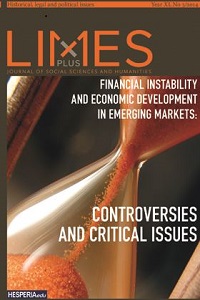
We kindly inform you that, as long as the subject affiliation of our 300.000+ articles is in progress, you might get unsufficient or no results on your third level or second level search. In this case, please broaden your search criteria.

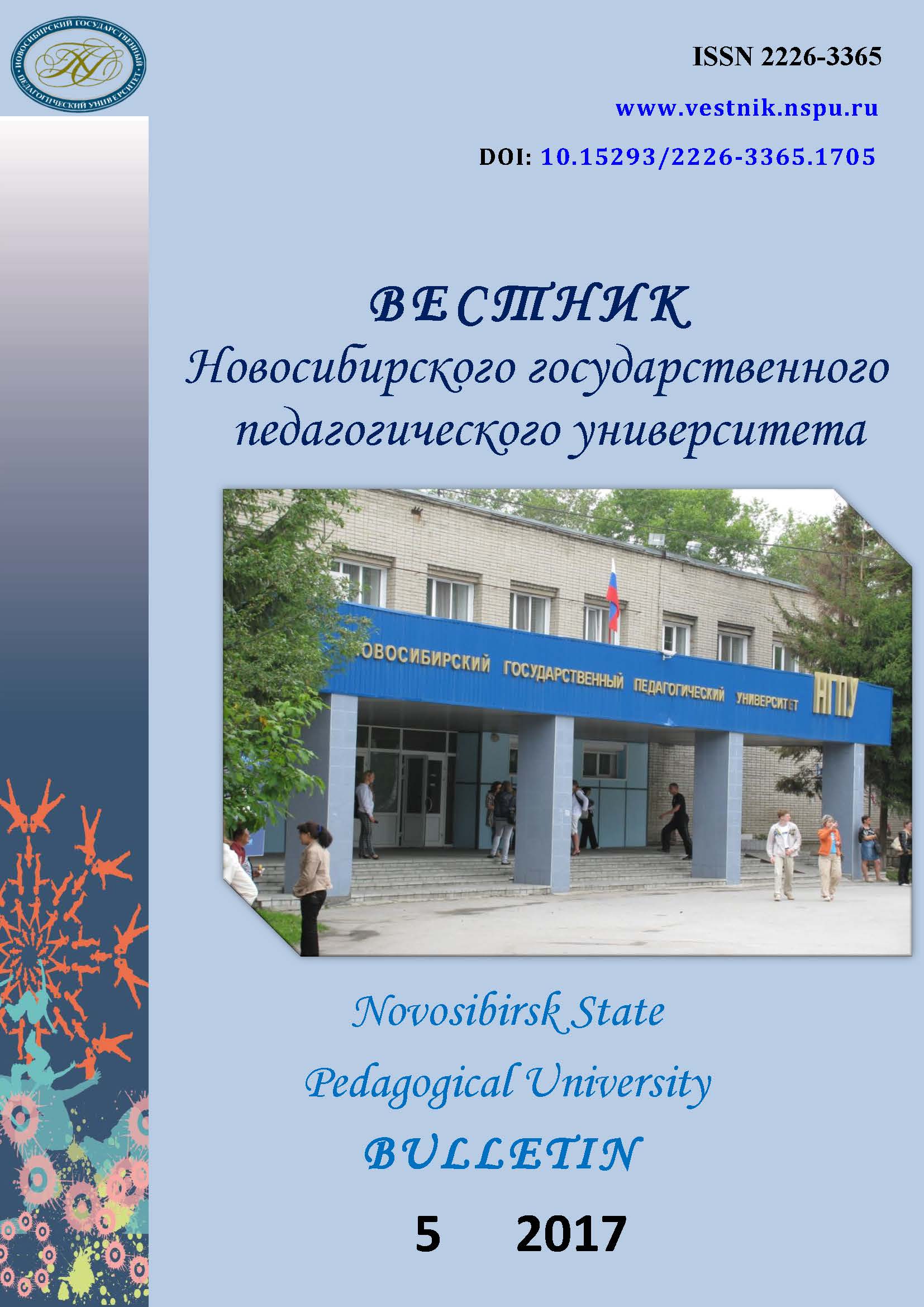
Introduction. The article presents a study on the application of project management to improving quality control within a healthcare setting in modern conditions. The article aims to explore the approaches to project management in the field of improving the quality of work within a healthcare setting with the main focus on domestic and international practices, and describe an integration model of improving the quality of healthcare services in sustainable healthcare settings applying project management based on the data of own research. Materials and Methods. The author employed general research (scientific) methods of empirical and theoretical investigation, general logical methods and techniques and methods of system analysis, comparisons and analogies, generalization, the materials of a sociological survey and expert survey and modeling. Results. The analysis of previous research findings revealed that project management is widely spread in different industries, especially in the field of software development, electronics, etc., and only a few researchers have been studying the applicability of this model to healthcare. Investigations of development stability within healthcare settings conducted by the author showed that the problem of implementing improvements to a setting as a whole and to the quality management system in particular, is adequate and appropriate at the present stage of healthcare development. The author stresses that sustainably developing healthcare settings need the technology for implementing organizational changes in the work of different departments without compromising the efficiency of their functioning. The author proposes an integration model of improving the quality of healthcare services, which combines the concept of sustainable development of a healthcare setting and project management. Conclusion. In conclusion, the author summarizes the main approaches to project man-agement in the field of quality of work within a healthcare setting on the basis of domestic and international practices.
More...
The author investigates the specificity of the modern understanding of the processes of the dynamic transformations of the valuable orientations of the young family in the Ukrainian society in the context of the functioning of the cultural norms and the belief generated under the influence of the social and economic, political and cultural environment.
More...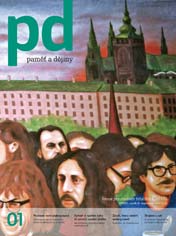
The paper sets out to define critically the Czechoslovak underground, which arose at the end of the 1960s and was active until the fall of the communist regime in 1989. The concept of “the system”, to which the underground was reacting to critically, directly or indirectly, is used to illuminate the genesis of the movement. It’s coexistence with the Western counterculture is also emphasized. The author questions the established thesis that the underground was apolitical and introduces a critical distinction between the terms subculture and counterculture, politics and sub-politics, and system and chaos.
More...
During preparations for the 14th congress of the Communist Party of Czechoslovakia (KSČ) measures were taking against “long hairs”. Until the 1970s the State Security (StB) had been primarily focused on “right-wing opportunists” (communists expelled from the party after August 1968). However, the “sudden” emergence of an underground community of “long hairs” had been an unpleasant surprise for StB officers.
More...
The problem of justice seems to be the common theme in Hanu Ancuţei [Ancuţa’s Inn] – Mihail Sadoveanu’s book of tales. The world portrayed by Sadoveanu functions according to archaic norms. Justice is made either by the ruler (or by his men), or on one’s own (provided there is enough strength), in accordance with some ancient laws. The helpless (when the ruler is not on their side) hope for divine justice. A coherent system of laws and fair judges, devoted to unbiased justice (similar to the German one, mentioned in one of the tales), remain a desideratum in this literary masterpiece.
More...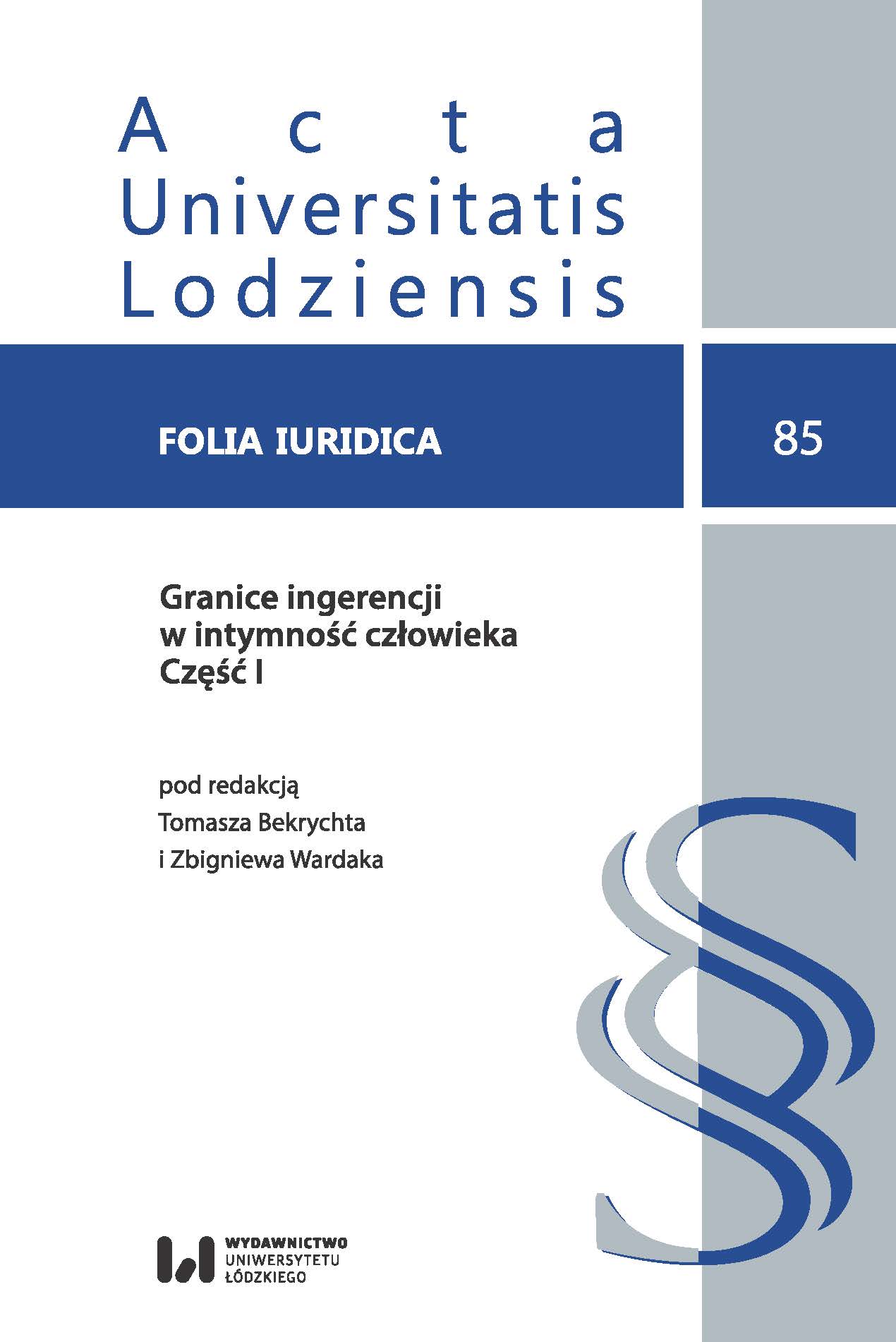
Prostitution is a phenomenon that evokes extreme emotions in the discourse. Stereotypes and myths in which the phenomenon of prostitution has outgrown dwarf the real picture of this phenomenon. Nowadays, the most important issue is a reflection on causes and consequences of this phenomenon. The phenomenon of prostitution puts to the test traditional concepts defining human sexuality – what its limits are and how to separate what falls within socially acceptable norms and what does not. Prostitution, on the one hand, appears as a necessity and on the other hand as a safety valve for the society. The ambiguity of the phenomenon of prostitution is illustrated by doubts around the legalisation on prostitution. // Prostytucja jest zjawiskiem wywołującym skrajne emocje w dyskursie. Stereotypy i mity, w które obrósł ten proceder, przyćmiewają jego rzeczywisty obraz. Istotna jest zatem refleksja na temat przyczyn i konsekwencji prostytucji. Negatywna konotacja wyrażeń, określających osoby świadczące usługi seksualne, wpływa na rozumienie i kształtowanie stereotypów. Istnienie prostytucji wystawia na próbę tradycyjne pojęcia definiujące seksualność człowieka. Z jednej strony jawi się jako konieczność, a z drugiej jako wentyl bezpieczeństwa społeczeństwa. Jakie są zatem jej granice i jak oddzielić to, co mieści się w akceptowalnych społecznie normach, a co nie. Wątpliwości związane z legalizacją prostytucji pokazują, jak niejednoznaczne jest to zjawisko.
More...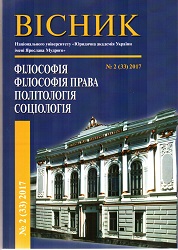
An article the philosophical basis of the problem of corruption analyzed. This shows that the principles of corruption based on mental characteristics and philosophical attitudes conditioned by culture and history. The experience of Poles, who have close psychological characteristics with Ukrainians and common historical parallels, is invaluable for Ukraine. Bribery and corruption have not only an economic but also a moral aspect. The main task of philosophy is to eradicate corruption by changing incentives, stereotypes, ideological guidelines. In the long term, anti-corruption strategies it must be supported by moral education and the strengthening of the ethical principles that underlie society. Despite the difficulties, Ukraine has the potential to overcome corruption. The country rooted problem of corruption, bribery. The problems of corruption and bribery have been rooted in the country since the time of the Soviet Union. Corruption, in turn, causes a crisis of confidence in political power. Ukraine and Poland have a common Soviet heritage. In the Soviet regime, corruption permeated the whole system of society. The experience of the Poles is very important for Ukrainians. Poles have similar mental characteristics. Corruption is the use by government officials and representatives of state bodies of official rights and powers to illegally enriched, receive material and other benefits and benefits both in personal and group interests. The system of corruption is two-sided and works only in the component correlation: the one who gives the reward and the one who receives it. Corruption is a socio-political concept. It includes a set of interrelated problems. It should be noted that the level of corruption in the country is an important marker when choosing a country for investment. The low level of corruption in Poland is one of the reasons why well-known companies choose Poland as a place for doing business. Thus, corruption fits into the system of social relations that people create. Corruption is a product of social reality, so it countered with the help of a social control system. This system maintains a balance of interests. In the situation of modern Ukraine, social control can overcome corruption. It organized as a civil lever of influence and control of its own structures. This is possible only if citizens of Ukraine realize their own responsibility. As part of the fight against corruption in Poland, formed in 2006, the Central Bureau for Combating Corruption. In Poland, corruption is a social and criminal problem, and for corruption, criminal punishment follows. Imperfect institutional structures actually cause or contribute to cor- ruption. Favorable ground for corruption – taxes and duties, government procurement, an institution of officials who distribute subsidies, benefits, medical or educational services, as well as licensing, uneven access to information and the like. Polish researcher А. Surdej notes that corruption thrives where the state perceived as a hostile organization, so people approve of corruption as a way to deceive and undermine the functioning of such a state. In the long term, anti-corruption strategies it must be supported by moral education and ethical principles. Appropriate policies and moral education in the end should solve the problem of corruption. Poland became the first country of the socialist bloc, which launched a peaceful dismantling of the socialist system. She has notable successes. Note that the fight against corruption must be multifaceted, so we must not forget about those mental and ideological institutions that provoke a person to corruption.
More...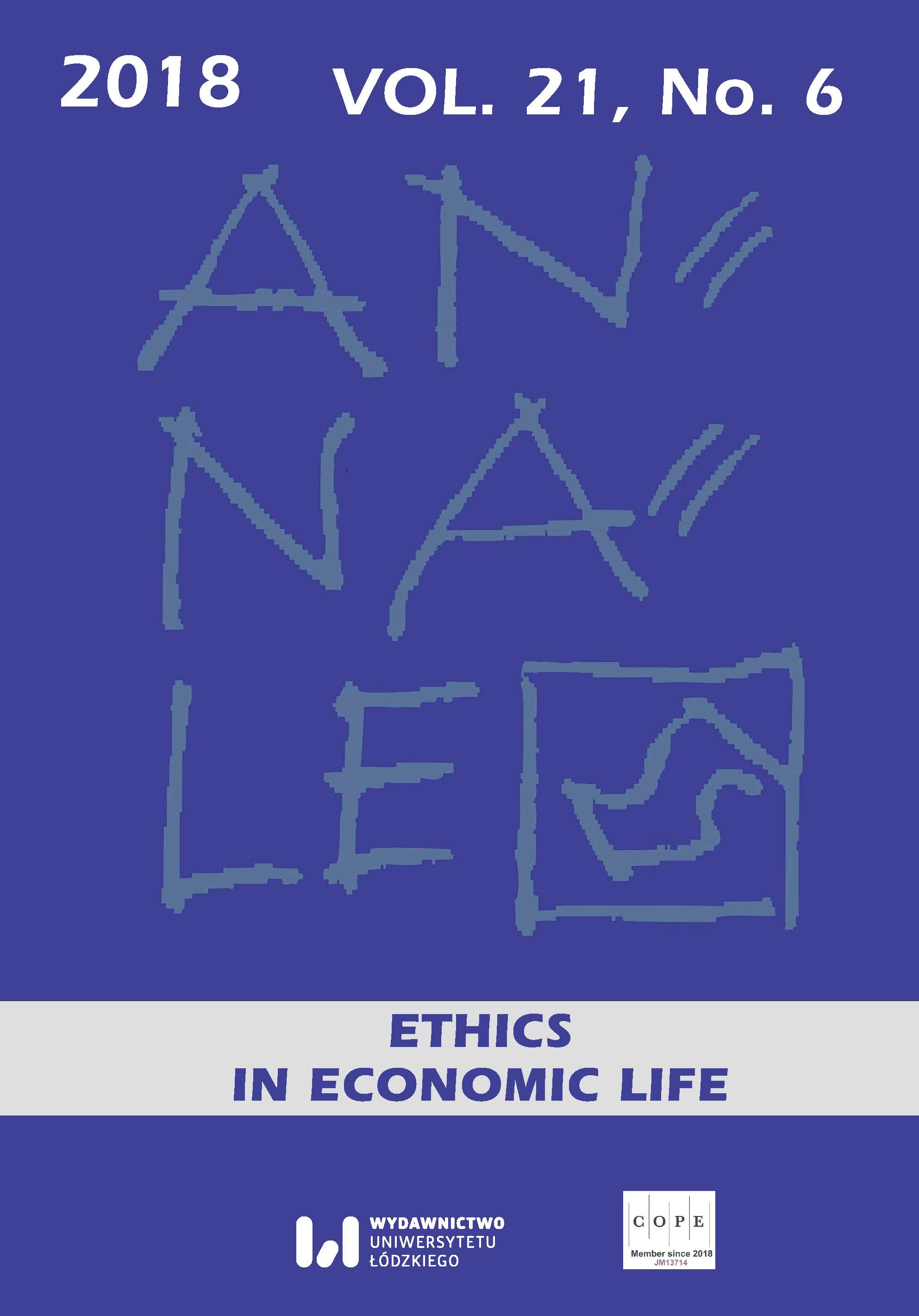
The article presents various links between business and ethics. The idea of responsibility, used to describe legal, economic and ethical aspects, forms the main, unifying thread. The author employs it to analyze three spheres of human activity. The first sphere, the subjective one, concerns self-responsibility, when individuals are striving to satisfy their own needs and to achieve happiness. The second, the encounter with the Other, embraces two meanings: responsibility for and towards the Other. The third sphere, the social one, extends the idea of responsibility onto the historical community we belong to. The concept of co-responsibility is not confined to our life span, but it embraces the future generations as well. The author pinpoints an important element in creating the foundations of a given community, i.e., regulations that form its basis, especially the principle of justice, encompassing the distribution of goods. Many contemporary authors underline this ethical, political and economic aspect (Rawls, communitarians, Ricoeur, Habermas). The main thesis the author would like to substantiate is as follows: in business activities, the ethical conduct of an individual is not sufficient. It needs to be broadened to encompass other perspectives since contemporary societies are based on the multidimensional idea of co-responsibility.
More...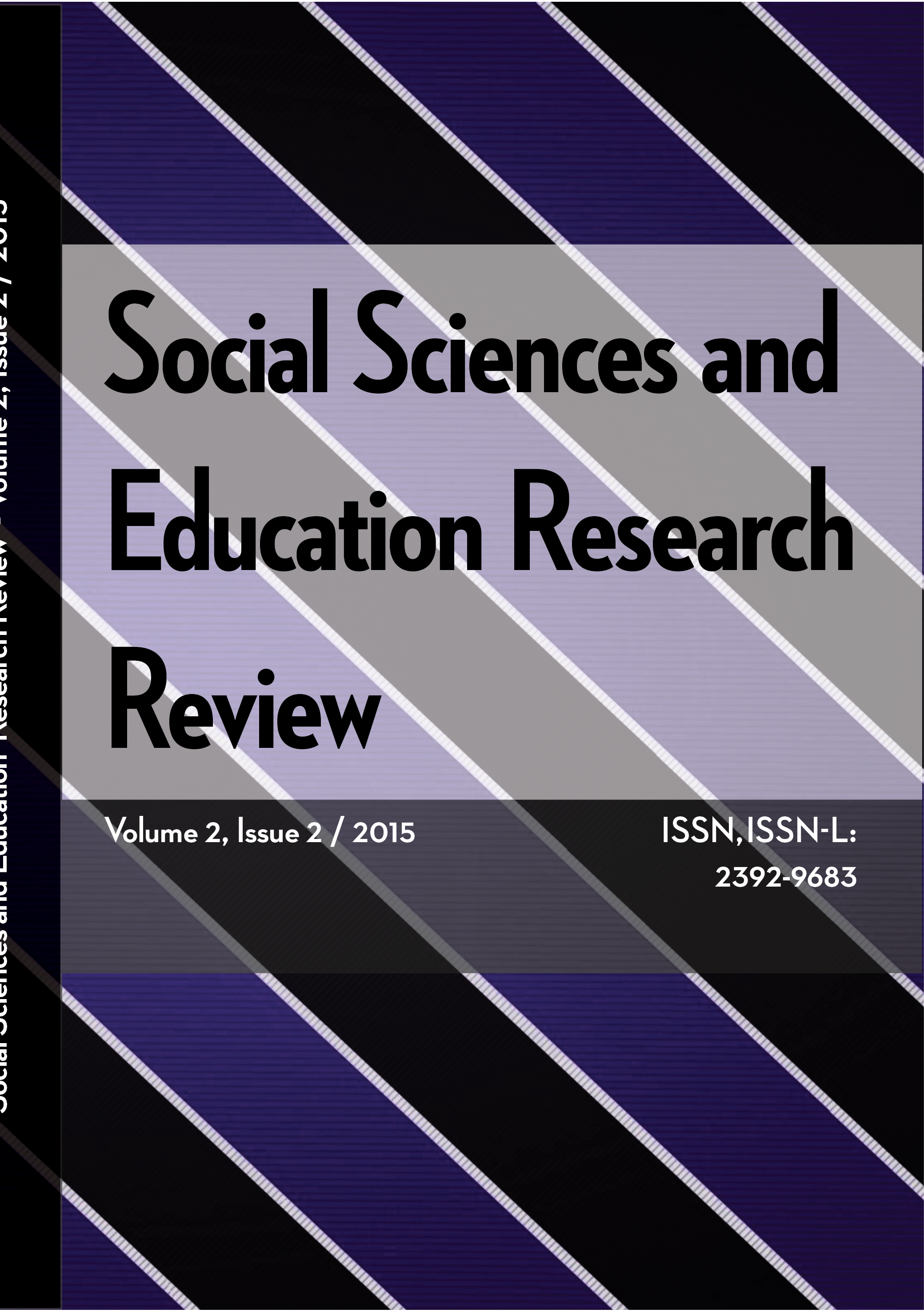
Scientific knowledge of different aspects related to conjugal violence is highly important for people directly involved, such as researchers, practitioners and the entire society. In this respect, globally, specialised studies continue to advance, offer correct definitions, clear descriptions, convincing assessments to certain issues, encouraging thus long-term research, since some specialists have managed to overcome restrictive or ideological methods and explanations. Moreover, in practice, debates reach almost all social, political and legal dimensions regarding appropriate and efficient forms of preventing conjugal violence. Unfortunately, in Romania there are fewer research and prevention approaches of this social problem. In general, attention is directed to domestic violence and conjugal violence is dealt with only implicitly. Considering the given context, the aim of the paper is to outline, by analysing specialised literature, a new research direction and implicitly, social intervention. I specify that this article represents a stage in the ongoing postdoctoral research project, entitled “Conjugal homicide. Aggressors and victims”.
More...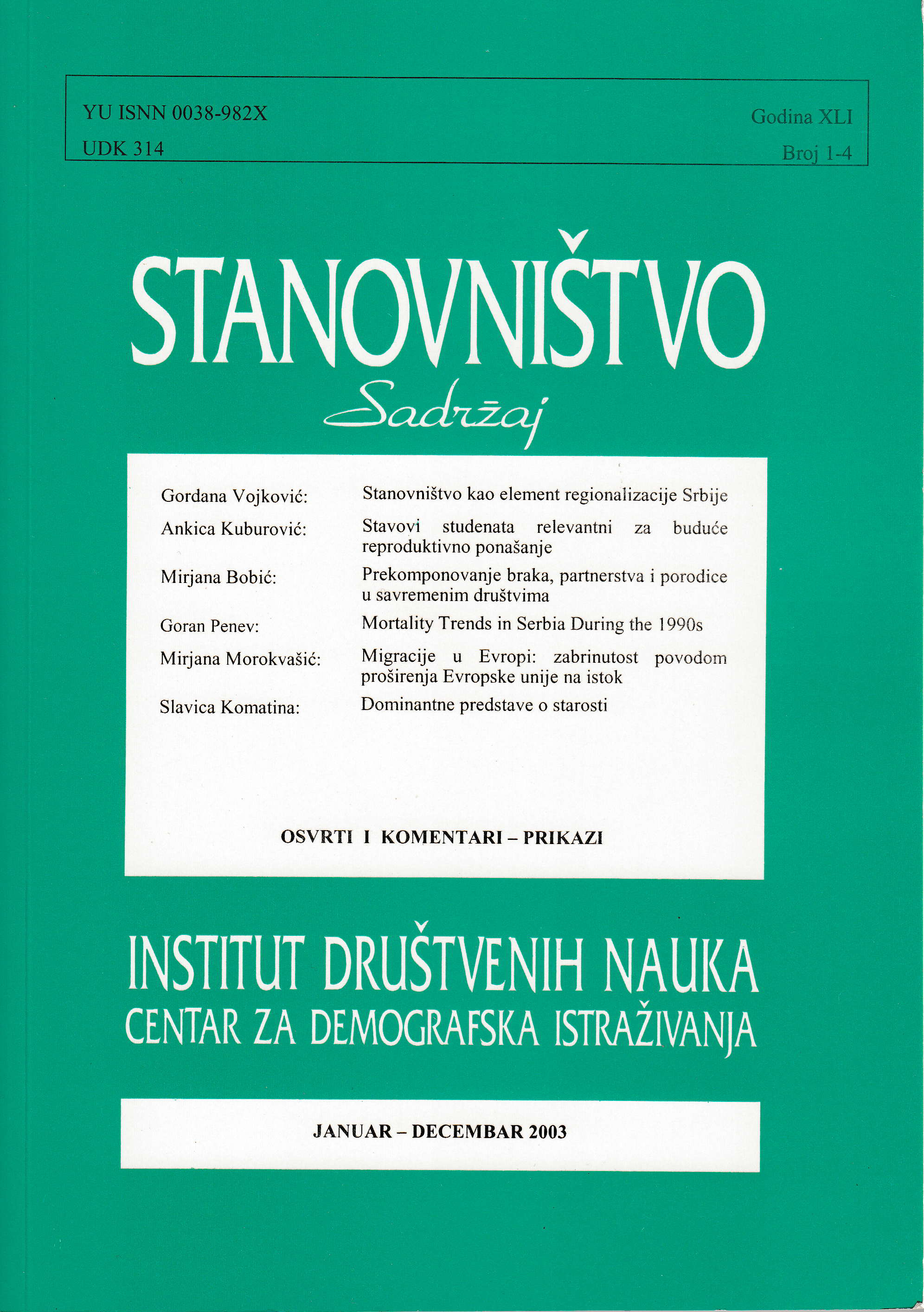
This paper deals with the various standpoints of students on their motivation for parenthood, planning and deciding on birth giving, influence between marriage and parenthood, parent role complexity and responsibility, on the knowledge of effect and consequences of the problem of insufficient birth giving, with an aim of getting to know the main characteristics of their possible reproductive behavior. The analyzed standpoints are part of a more comprehensive and inclusive research, carried out on a sample of 1494 surveyed persons (1000 secondary-school pupils and 494 students) in four biggest regional centers – Belgrade, Novi Sad, Kragujevac and Niš. The orientation only to student’s standpoints had an aim to more completely analyze the already abundant empirical material, which is acceptable due to the fact that students are closer to beginning of birth giving according to their age-situation characteristic. The willingness and desire of the students to become parents is significant, but this is only one of their varied life aspirations (importance of partnership, professional engagement…). The intention is to bring into accordance the realization of the most important roles, which actually indicates to a fairly uniform importance in satisfying the basic individual needs. Apart from that, the need for parenthood is dominantly emotional and altruistic, which can be satisfied by having only one child. Possible reproductive norms – which are directed to having two children, whereby they are higher than the current fertility rates, but also somewhat lower normatively determined expectations in relation to the desired number of children, as well as a significant orientation towards marriage and parenthood and the existence of the knowledge on the problem of the impossibility of simple reproduction and conscience of social need for population reproduction – represent a gap for realization of measures for motivating birth giving and parenthood rehabilitation.The possible reproduction model is not significantly determined by gender, because the noted differentiation in frequency of certain standpoints does not indicate to formation of "female" and "male" reproductive models. On the other hand, possible qualitative changes in relations between partners are noted which are manifested in more uniform engagement in birth control and decision making, as well as a more uniform representation of motherhood and fatherhood in realizing the basic needs of the child.
More...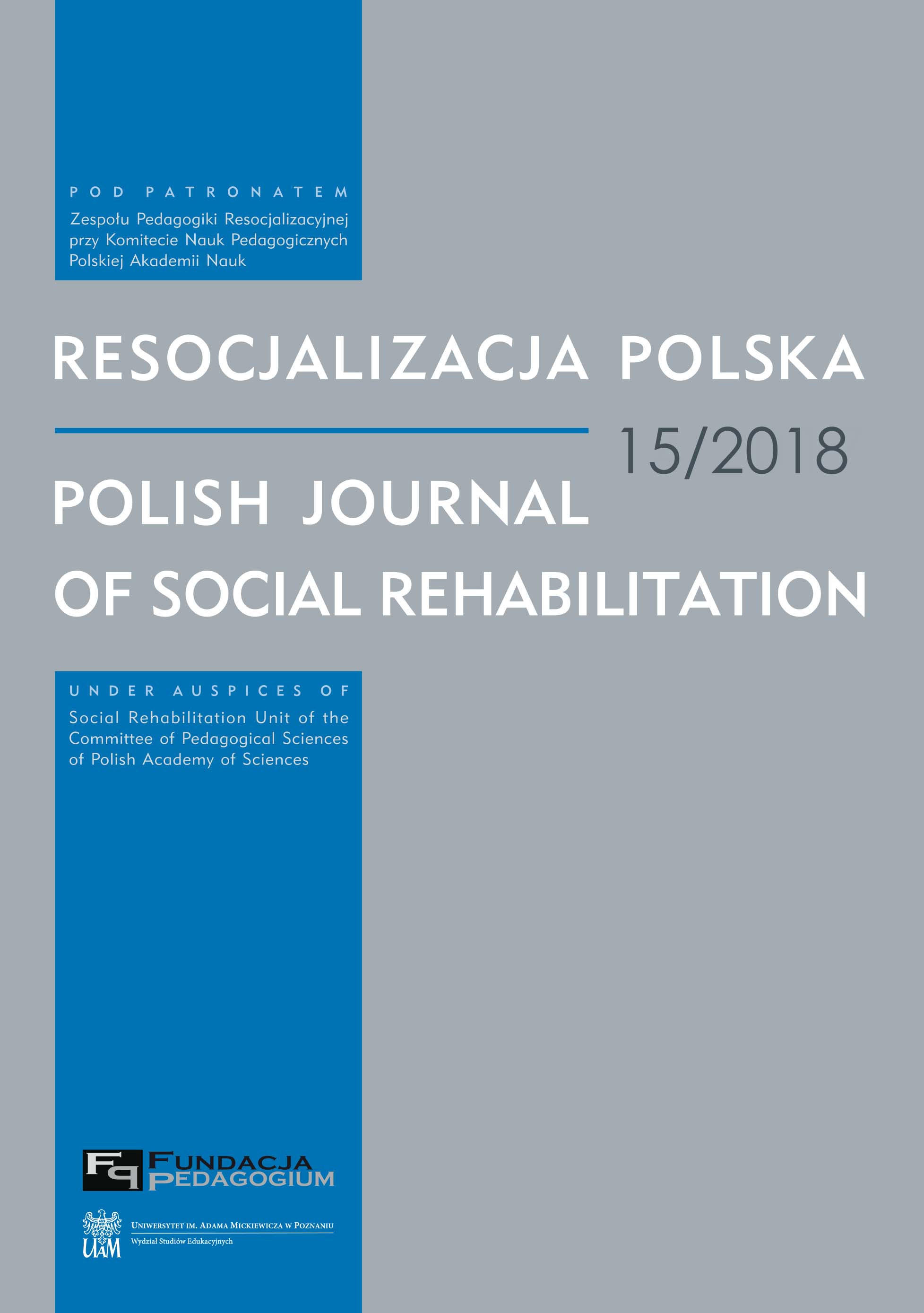
Humanizing the punitive justice system includes help in direct understanding and the process of learning a person to change the dependence and dependence in the state of self-organization and personal control of their lives. Aid interactions should not be an obstacle to individual development of the individual and the release of the dynamism of self-assertion. In the process of learning, one must respect the possibilities and dignity of a person, because then the individual who meets with respect regains personalist value and can voluntarily recognize the need to improve his situation. Adaptation should be based on a definite system of norms and values of the whole social society, setting out specific goals and life plans that could be implemented and implemented by a former prisoner in a living environment together with a guardian.
More...
The study of the prison system reform in Poland is a perfect illustration of the political changes that Poles have undergone from a system marked by Soviet totalitarianism to a society that meets the criteria of democracy Ukraine's aspirations to adapt EU solutions in the field of penitentiary reform encourage to learn about Poland's experiences due to the progress of this country in eliminating the communist legacy in the work of the prison system and the Prison Service that oversees it. This task is also valid for contemporary Ukraine and due to the deep cultural and mental ties connecting the two countries, Polish experiences seem to be extremely inspiring. When using the experience of neighbors, one should not forget about the differences. First of all, it should be noted that the period of communism in Poland was clearly shorter, compared to the 70 years of experience of Ukraine, Belarus and other Soviet Republics which, unlike Poland, did not experience full sovereignty. The key to the success of the reforms in Poland was the fact that they were carried out by new, often young people who were prepared to work on the basis of modern knowledge not related to the previous system. Poles condemned the crimes of communism and its legacy. In Ukraine, this has definitely not been done so far, and this is one of the reasons for the failure of the reforms.
More...
The article analyses parental attitudes of mothers and fathers serving prison sentences. A comparison was made between the attitudes of 50 women and 50 men, parents of minor children up to the age of 18, who had been raising them up before they were imprisoned and maintain regular contact with them during their imprisonment. In M. Plopa's Parental Attitudes Questionnaire, convicted fathers achieved high scores in the subscale of requirements, while low scores within the scope of autonomy and protection attitude. Convicted mothers, in turn, tend to adopt an excessively protective and inconsistent attitude towards their children. The intensity of individual parental attitudes depends on the type of crime committed. The perpetrators of crimes against the family, compared to other parents, accept their children to a significantly lower degree and are significantly more demanding towards them. The results of the survey clearly indicate that respondents carry out their parental roles improperly, which probably disturbs mutual relations in their families. It was suggested that in penitentiary work with sentenced parents a comprehensive and systematic diagnosis of parental attitudes should be carried out and their pedagogical awareness should be raised, among others, through shaping the ability to communicate with a child, appropriate selection of punishments and rewards, showing affection.
More...
Presently we are noticing that social control over youth showing symptoms of demoralization is being excessively formalized - especially in case of individuals just on the verge of demoralization, and, at the same time, too arbitrary a role of the judge in cases involving juveniles. Despite legal possibilities, Family Court rarely applies mediation proceedings. In the years 2004-2016 the most mediations occurred in 2006 (366) and the fewest in 2014 (198). In 2016 there were 25 mediations, including 13 in Lodz. The presentation is aimed to show the research on juvenile cases addressed to mediation proceedings by Lodz courts in the years 2011-2016. The subject of study is the content of court files and mediation reports concerning the final results of the mediation and terms of agreement if made. Basing on research analysis we may reason that the only cases directed to mediation are the ones where the victim and the perpetrator are minors and the criminal act was extortion, bodily harm or harassment. The number of cases directed to mediation proceedings suggests that judges are still not fully convinced of the validity of restorative justice.
More...
Communication competences are among key social skills, allowing people to fulfil their own needs in concordance with applicable norms. Research proves that their development constitutes an important factor preventing from engagement in peer crime in the adolescence period and plays a significant role in proper social adaptation. Therefore is seems justified to carry out activities developing communication competences in minors, based on diagnosis and evaluation, also due to the fact that the majority of them have large deficits in that regard. The article contains the results of evaluation studies confirming the possibility of effective development of communication competences of pupils in institutional social rehabilitation environment.
More...
The article is concentrating on the subject matter of the quality of life of probation officers with particular reference to the analyses of meaning of chosen factors shaping her. Besides analysis of literature connected with satisfaction from living as the essential condition of the welfare and characteristics of the work of the probation officer, findings were also presented own. They conducted research in teams of the probative court service by regional courts in the area of the jurisdiction of Circuit Court in Gdańsk. Choice of the court circle was intentional and 73 KSS officers took part in them. Diagnosing the quality of life of officers of the Probative Court Service as well as verifying was the subject of the research relations between variables sociodemographic and organizational and with level of practical satisfaction. Examinations showed that above all social relations and their quality, the sense of security, character of the performed work as well as a lifestyle and the level of practical aspiration influenced the quality of life of probation officers. Probation officers are happier from the whole of Poles, in spite of carrying peculiar professional obligations out by them. They aren't diversifying the level of satisfaction from the life into the significant way predyktory socjodemograficzne and organizational. Findings are showing among others that probation officers which more often work in the environment of charges, are de facto more satisfied than, the ones which perform their duties mainly in the seat of the court.
More...
Intimate partner violence is a difficult experience for ever, or at least for a very long time, disturbing family life, robbing the victim of a sense of safety, which is one of the most important human needs. This problem cannot be ignored. Therefore, the legal system provides certain mechanisms designed to protect victims of violence. Are these measures effective? The article discusses this problem, providing answers to this question, based on the results of research conducted as part of the international project SNaP „Special Needs and Protection Orders”, which is part of the Daphne III programme. Qualitative research (multiple casestudies) were conducted among practitioners, whose work is concerned with domestic violence were supplemented with an analysis of case files from the District Court in Białystok. Practitioners evaluate selected measures of protecting female victims of intimate partner violence more or less positively, depending on the represented area of support. Polarisation of opinion is natural. However, there is no doubt that the effectiveness of protecting victims of aggression in the household increases, but the still existing problems of the system have to be addressed so that they can be improved in the future.
More...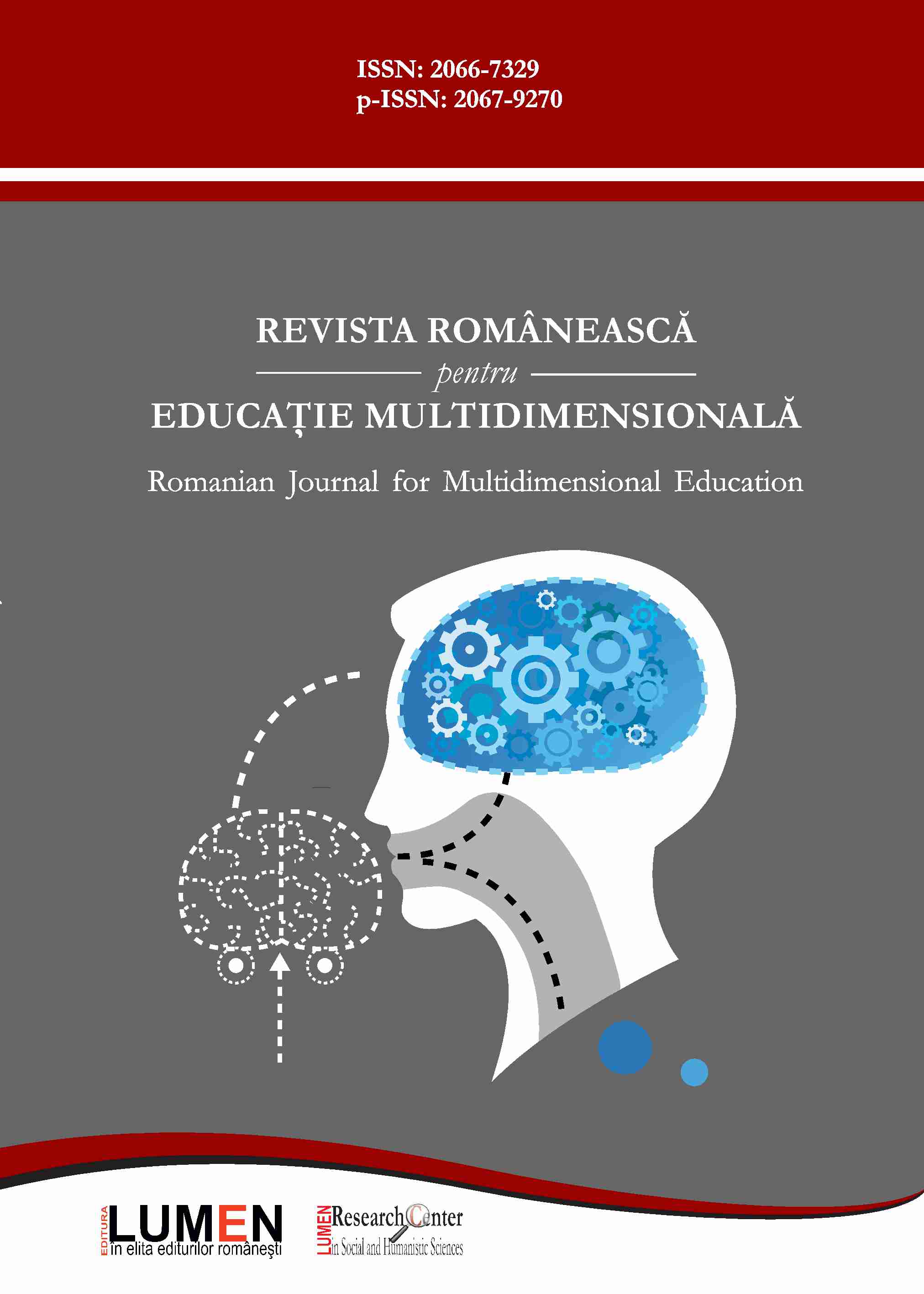
This study provides significant information regarding the descriptions and definitions of values revised by Schwartz in 2012, where values can be displayed on a circular continuum of motivational dynamic relationships. One 46 items online questionnaire (assessing the perception of values) was administered to 220 participants from the West side of Romania. The 46 items instrument presented a strong internal consistency (an alpha coefficient of .839). This study provides information regarding the inter classes dynamic associations between benevolence as a self-transcendence value and humour as an openness to change value. Findings and conclusions are discussed.
More...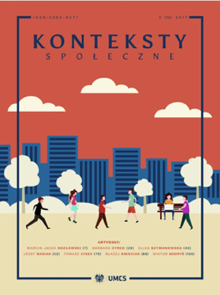
Esej opisuje zjawisko „drapieżnych konferencji”, przedstawia ich charakterystyczne cechy oraz opisuje spowodowane tym problemy, przynoszące szkodę nauce. Drapieżne konferencje nie prowadzą rzetelnego procesu recenzyjnego, często mają fikcyjny komitet organizacyjny, nie są przejrzyste w kwestiach finansowych oraz siedziby, i publikują niemalże wszystko w publikacjach pokonferencyjnych. W zakończeniu artykułu wskazane jest, jak można walczyć z „drapieżnymi konferencjami”.
More...